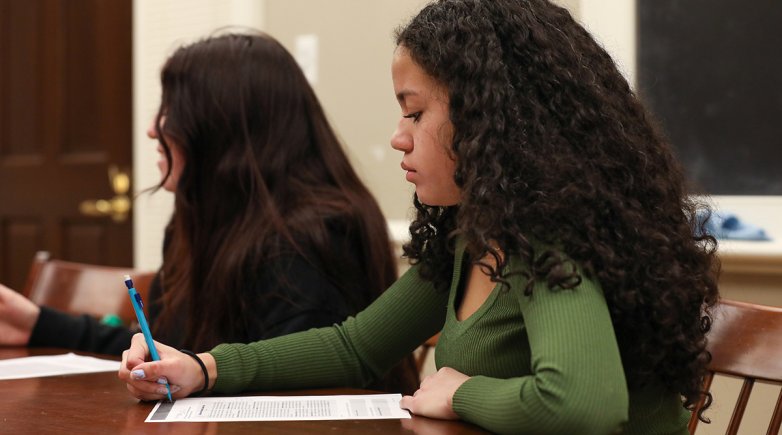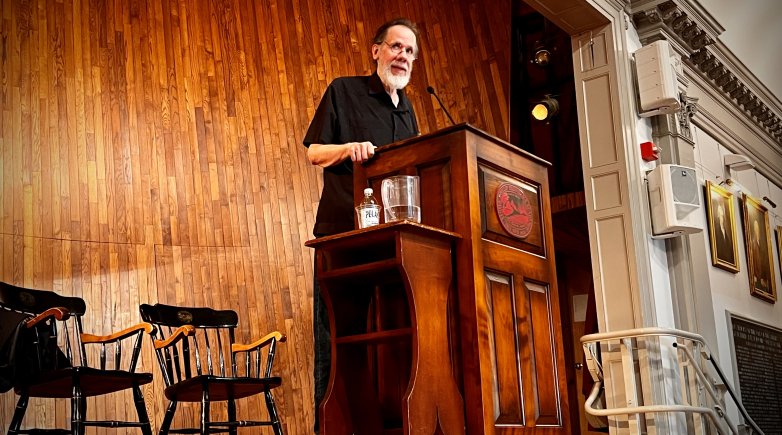In the new class, students are challenged by reading literature in Spanish, including difficult works by authors like Pablo Neruda. Delgado stresses that the language is in their brains, and that the class is about drawing it out. As a result, the students usually move quickly through a lesson, and he often finds himself adjusting his plans accordingly.
At the end of the two-class sequence, Delgado will assess each student’s level to decide placement for the next term. He believes they will all be placed at an advanced level, either 320: Advanced Spanish or 400: Panorama of Latin American and Spanish Readings, which will be close to satisfying their language requirement after only one year at Exeter.
Two students who took the course during the fall term advanced to the 500 level. One was Siena Saavedra Bagdonas ’26, who moved to the United States from Mexico when she was around 7 years old. “I kind of put so much focus into learning English that I shut off from Spanish for a while,” she says. “We’re all bilingual in my house, but we fall [back] on English.”
As she got older, Saavedra Bagdonas began making more of an effort to regain some of the comfort with Spanish she had lost. By the time she applied to Exeter, she spoke fluently again but had received little formal instruction beyond an elementary-level class in middle school, where she ended up serving essentially as the teacher’s assistant. Her teacher would give her reading materials on the side so she could begin to improve her Spanish literacy, which served her well in the fall Spanish for Heritage Speakers course.“The way you learn a language naturally versus the way you learn it in a classroom is just so not the same,” Saavedra Bagdonas says. “Overall, Dr. Delgado would teach the group, but if there was something he felt some of us knew more than others, he would separate us.”
This winter, she took SPA552: Fantasy and Reality in the Latin American Narrative, devouring works by Gabriel García Márquez, Jorge Luis Borges, Julio Cortázar and others. Her language requirement fulfilled, Saavedra Bagdonas is pondering taking a course in French or Japanese but also plans to enroll in other 500-level Spanish courses. “The thing for native speakers is we need practice more than anything else,” she says. “I don’t think I would have gotten [that practice] if it weren’t for the heritage Spanish class.”
Though Max Albinson ’25 doesn’t have Hispanic heritage, he attained a high level in Spanish by attending school and playing with a local basketball team in Barcelona, where his family moved when he was around 10. When he enrolled at Exeter, he was given the choice between an intermediate class or Spanish for Heritage Speakers and chose the latter. “The classroom environment is what really did the most for me,” Albinson says. “You’re in an environment with all these kids with this diverse set of backgrounds, but you’re also bonded through a language that you all know so much about but aren’t quite there on fully understanding how to do it in an institutional manner.”
Albinson is now taking SPA503: Family, Community and Contemporary Life. “My language requirement will be fulfilled by the end of this term, and that’s all thanks to being in the heritage class.” He plans to use the increased flexibility to polish his Spanish through more classes, and to take electives like epistemology, anthropology and economics.
The students in the Spanish for Heritage Speakers courses may have different levels of fluency and comfort, but they share a personal connection to the language and culture that sets them apart from other language learners. They also come from different backgrounds, and the classes include sharing different experiences and perspectives from the Hispanic/Latino world in the United States and beyond. “They need to understand how to deal with their own hybrid identity in this country,” Delgado says. “That is very important to me, as important as the language.”
Back on the fifth floor of Phillips Hall, the students in SPA13H muse on the practical impacts the class has had. Cristina Ortiz ’26, who is of Puerto Rican heritage, says she spoke Spanish in the house until she was 7 because her grandmother, who took care of her, didn’t speak English. “I don’t really know why, but after that age, we just stopped speaking Spanish at home, until now where I feel like we primarily speak English,” she says. Recently, however, she was on the phone with her grand-mother, and something had changed. “She’s like:
‘Wow, you’re using words you’ve never used before. I’ve never heard you speak like this.’”
Valdez agrees. “I had no idea what a subjunctive verb was before I came to this course,” she says. “Now I’ve been speaking to my family in Spanish a lot more, and I’ve finally been able to speak to my great-grandma, who only speaks Spanish, without needing my grandma to translate. That’s been nice.”
This story was originally published in the Spring 2023 issue of The Exeter Bulletin.

